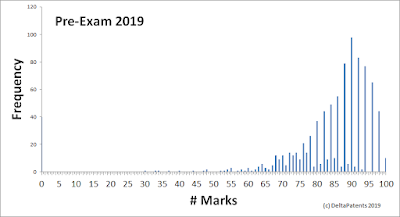D 3/19 - The term "must" in statement 4.1 of Pre-Exam 2019 leads to ambiguity.
Today, decision D 3/19 was published online (here).
The decision is reproduced below in its entirety, with emphasis added.
Statement 4.1 of Question 4 of Pre-Exam 2019 read:
The statement was also discussed at our Pre-Exam blog: is it TRUE in view of R.6(1) as the Examiner's report indicates, or FALSE as R.58 provides for a remedy such that there is no sanction of the translation is filed in the 2m period from notification of the R.58 invitation?
Also see similar (albeit slightly different) statements in Pre-Exam 2014, 8.2 ("Regarding EP-Z: the prescribed translation shall be filed within two months of filing EP-Z") and Pre-Exam 2017, 4.3 ("According to the provisions of the EPC, Adrienn must file the translation of the description within two months of filing of EP-A"); those statements also did not contain a sanction (see reason 2.1-2.2 below). Those statements had also been topic of discussion at our Pre-Exam blogs.
The decision is reproduced below in its entirety, with emphasis added.
Statement 4.1 of Question 4 of Pre-Exam 2019 read:
The statement was also discussed at our Pre-Exam blog: is it TRUE in view of R.6(1) as the Examiner's report indicates, or FALSE as R.58 provides for a remedy such that there is no sanction of the translation is filed in the 2m period from notification of the R.58 invitation?
Also see similar (albeit slightly different) statements in Pre-Exam 2014, 8.2 ("Regarding EP-Z: the prescribed translation shall be filed within two months of filing EP-Z") and Pre-Exam 2017, 4.3 ("According to the provisions of the EPC, Adrienn must file the translation of the description within two months of filing of EP-A"); those statements also did not contain a sanction (see reason 2.1-2.2 below). Those statements had also been topic of discussion at our Pre-Exam blogs.








